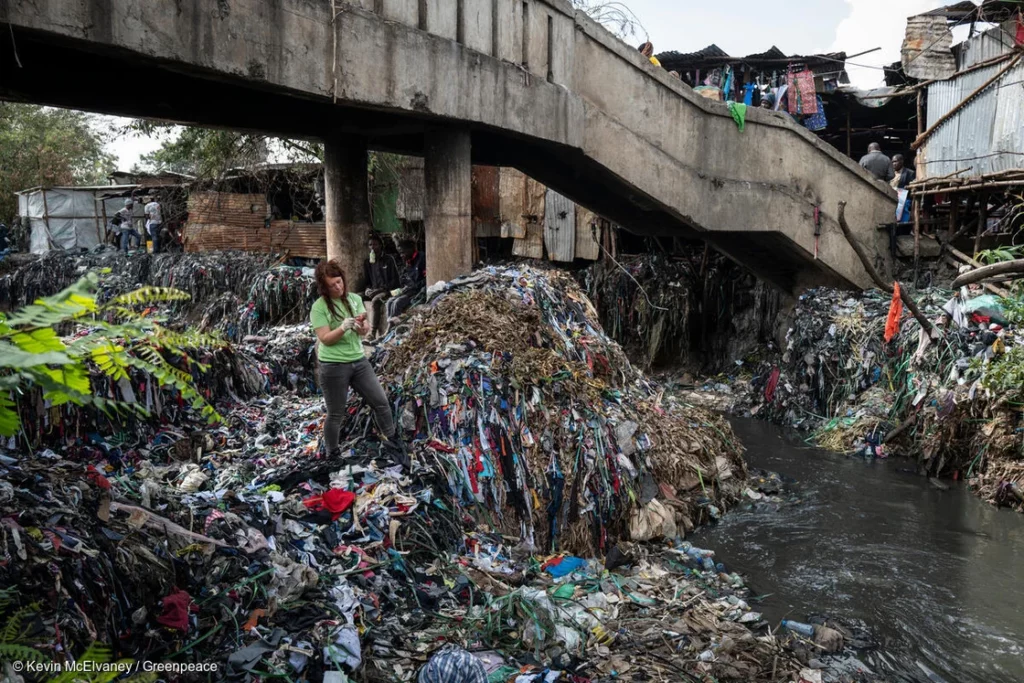Take Action and Sign the Petition!
Greenpeace has just launched a new petition urging people to stop fast fashion. The issue is very dear to us, indeed, our perspective on fashion stands in stark contrast to this. So, we invite you to read and take action.
Notice: The content presented in the post is sourced from Greenpeace investigations and reports.
Fast fashion: a polluting and unsustainable industry
Clothes sold and returned immediately. Accessories designed to last only one season. Destined to break within a few weeks. And soon ending up in landfills or in the Global South. With mass production, low quality, and ridiculously low prices, the fast fashion industry generates enormous amounts of waste and pollution. And behind the false promises of sustainability often lies greenwashing and a devastating environmental and social impact.
Fast fashion in 3 numbers:
- 25%: the percentage of new clothing unsold and discarded every year
- 1 second: every second, a truckload of discarded clothing is either burned or thrown into landfills
- -1%: it’s the amount of clothing that is actually recycled into new garments.
Every year in Europe, 230 million pieces of clothing get destroyed.

Textile fibres
Over 60% of the textile fibres (acrylic, polyester, nylon) used to produce our clothing are synthetic fibres, and many are derived from hydrocarbon refining, such as gas and oil. Polyester, derived from petroleum, begins to release microplastics after the first few washes, which end up in the oceans and then move up the food chain, also in our food. The fossil fuel industry grows and proliferates thanks to fast fashion as well.
The dark side of the most famous brands
- Shein: According to 2022 data, many of its garments contain toxic substances, with some exceeding legal limits, particularly phthalates, up to 600% of the legal limit.
(source: Greenpeace investigation 2022) - Nike, Ralph Lauren, Diesel: A 2022 investigation demonstrated that waste from the production of clothing and footwear for these three brands was being burned in brick kilns in Cambodia, exposing the involved workers to toxic fumes.
(source: Greenpeace/Unearthed investigation) - Amazon, Temu, Zalando, Zara, H6M, OVS, Shein, Asos: Clothing returned after purchase on the most famous e-commerce platforms travels up to 10,000 kilometres and often is not resold.
(source: Greenpeace investigation 2024)
Online returns: clothing travelling up to 10,000 kilometers
Clothing purchased and then returned multiple times. Parcels of clothing travelling for tens of thousands of kilometres between Europe and China, with no cost to the buyer and minimal expenses for the producing company. But with huge environmental impacts. This is what emerged from the Greenpeace Investigative Unit Italy investigation, which, for about two months, in collaboration with the television program Report, tracked the journeys of some garments in the fast-fashion sector purchased and returned through e-commerce platforms. It revealed a schizophrenic logistics chain, extremely long journeys, and the environmental impact in terms of equivalent CO2 emissions.
Sustainability? It’s just greenwashing!
Fast fashion companies promote their supposed sustainability and respect for better working conditions by stating on labels that their clothing items are produced with a lower environmental impact. However, it often amounts to nothing more than greenwashing. Our investigation of 29 brands has revealed the truth, and globally recognized brands such as Benetton Green Bee, Calzedonia Group, Decathlon Ecodesign, H&M Conscious, and Zara Join Life, just to name a few, have received a red mark regarding the credibility of the statements on their labels.
Greenpeace: sign the petition!
In conclusion, fast fashion, the ultra-rapid fashion sold at very very cheap prices, is not harmless. Unfortunately, the low prices are achieved through the exploitation of workers and harm to the environment. Of course, it wouldn’t exist without modern-day slavery. However, there are alternatives to fast fashion for every budget, for instance, vintage, second-hand and slow fashion. Most importantly, it’s a matter of education and awareness, accessible to all. No excuses left!
So, take action now by signing the Greenpeace petition to stop fast fashion and protect our planet! 👉 sign it here!